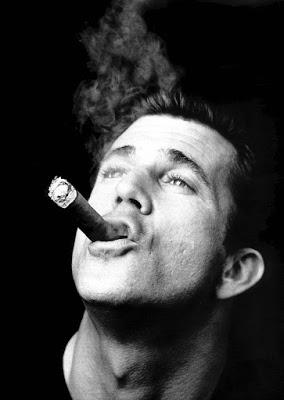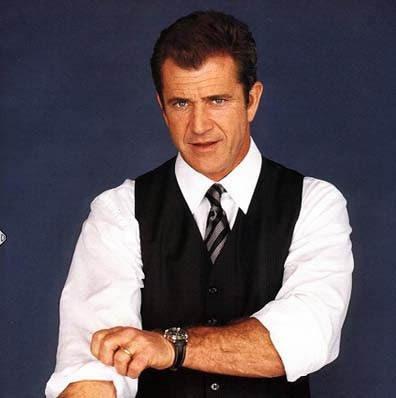
Mel Gibson, whom I interviewed for Venice Magazine in late 2000, was my first real childhood hero I sat down with. If you were a Gen-X male, Mel Gibson was the closest thing we had to Paul Newman, Steve McQueen and Sean Connery: a guy's guy whom guys wanted to emulate and women wanted to copulate. If you were a guy who liked girls, the math in the previous equation was pretty simple: be like Mel. Sadly, Gibson's life has taken a very public turn for the worse in the last decade, since his personal legal and troubles, stemming from a 2006 DUI arrest in Malibu, were made public, one from which his image has yet to fully recover. It was an unfortunate fall from grace for a guy who literally had Hollywood, and the world, in the palm of his hand after sweeping the 1995 Oscars with his box office smash "Braveheart." However, our meeting took place years before this, when Gibson was still riding high.
Some vivid memories: Gibson, to date, is the most intense human being I've ever met. I don't say this as a negative, because he couldn't have been more friendly, open, charming and personable. But it's as if every muscle in his body was coiled both times we spoke, once at the Four Seasons Hotel in Beverly Hills, and later in his Icon Productions offices on the Paramount lot. "Laid-back" is simply not who he was. His quick wit was palpable, with a mind that moved with speed and precision of a Ferrari racing engine. Gibson was intellectual, yet very self-effacing, belying his Aussie roots: anytime he seemed to come off as "too smart," he retorted with a mild put-down of himself, followed by a quick chuckle. Although a serious person surely resided within, he didn't want you thinking he took himself too seriously. Finally, I'll never forget how utterly fair and square he was with me, answering my questions honestly and openly and giving me one of my favorite interviews.
Our childhood heroes are bound to let us down on some level as we grow to adulthood, as is the price of wisdom and life experience. That said, I miss my hero Mel Gibson, and all he seemed to bring to the table.
THE TAO OF MEL
By Alex Simon
Editor’s Note: This article originally appeared in the December 2000/January 2001 issue of Venice Magazine.
A complaint often heard by modern-day moviegoers who long for the stars of yesteryear, is that there are no more Clark Gables, Alan Ladds, Montgomery Clifts, or Steven McQueens to grace the silver screen with their bigger-than-life, old-world, manly exploits and rough-hewn charm. There's one major flaw in that argument, however: it's not true! Case in point: Mel Gibson. If you think about it, no other film actor in recent memory combines all the qualities of a classic movie star (striking good looks, adept at playing action heroes and romantic leads, press and fan-friendly) with more modern elements of stardom, such as the ability to constantly re-invent oneself to suit changing times.
Mel Gibson was born in Peeskill, NY January 3, 1956, number six of eleven children. In 1968, when Gibson was 12, his father Hutton Gibson, a railroad brakeman, won a small fortune on "Jeopardy" and used his winnings to move the Gibson brood to Australia. After graduating high school, Gibson's sister enrolled him (without his knowledge) in Sydney's National Institute of Dramatic Art, having a hunch that her brother's flair for the dramatic might be channeled in a positive direction with a bit of coaching. The fact that Gibson has gone on to become one of the world's most respected actors and filmmakers, as well as one of its most popular movie stars, is testament enough that the hunch paid off.
Gibson made his screen debut in a 1977 quickie called Summer City, which was seen by a young doctor-turned-filmmaker named George Miller, who was casting his first low-budget feature, a futuristic thriller called Mad Max (1979). Legend has it, the night before his audition, young Mel got a shiner in a barroom brawl, and it was that extra scruff on his otherwise flawless face that helped earn him the role that made Mel Gibson an instant star in Australia and Europe. Gibson followed Max with the romantic drama Tim, co-starring with Piper Laurie as a young handicapped man who has an affair with an older woman. Gibson won the Australian Film Institute's Best Actor award for his work. Two years later, Gibson's work in Peter Weir's legendary WW I drama Gallipoli captured him a second AFI Best Actor award, as well as worldwide recognition that he was much more than a pretty face. Full-fledged movie stardom in America proved elusive until the release of the Mad Max sequel The Road Warrior (aka Mad Max 2, 1981) hit North American shores in 1982. The box office smash solidified Gibson's star power with his turn as a post-apocalyptic version of Shane, protecting a settlement of scientists from a marauding gang of freaks and mutants. Gibson teamed with Peter Weir again for the mesmerizing The Year of Living Dangerously (1983), a romantic/political drama set against the backdrop of Indonesia in 1965. He followed this with a riveting interpretation of Fletcher Christian in the revisionist tale The Bounty, co-starring Anthony Hopkins as Captain Bligh. His next two efforts, The River and Mrs. Soffel (both 1984) earned some critical acclaims, but performed poorly at the box office. The third Mad Max: Beyond Thunderdome (1985) was a solid capper to the series, but it was with the first Lethal Weapon film in 1987, that Gibson established himself as the cinema's leading action hero. His portrait of suicidal cop Martin Riggs, a combination of Three Stooges lunacy and full-blown psychosis, electrified the screen and helped to re-invent the cop movie genre, spawning three sequels, and countless imitators. Robert Towne's Tequila Sunrise (1988) featured Gibson in a noir-like turn as a drug dealer with a heart of gold who falls for comely restaurateur Michelle Pfeiffer. In 1989, Gibson formed Icon Productions with business partner Bruce Davey, producing his own projects, as well as those of other filmmakers, such as Bernard Rose's Immortal Beloved (1994), starring Gary Oldman as Ludwig van Beethoven.
Just when it seemed certain that Gibson would inherit the mantle of action star icon from such stalwarts as Eastwood and Schwarzenegger, Gibson astounded critics and audiences alike with a kinetic interpretation of Hamlet (1990), directed by Franco Zeffirelli, proving again that there was much more to Mel Gibson than met the eye. Gibson took this one step further with his directorial debut The Man Without a Face (1993), a touching coming-of-age story in which he also co-starred. It was his magnificent turn as star/director/producer of the epic Braveheart, however, that cemented his status as a genuine Hollywood icon (no pun intended). Based on the true story of 13th century Scottish rebel William Wallace, who led an uprising that nearly destroyed the British crown, Braveheart was a sweeping, magnificent film that many critics compared to such masterpieces as Lawrence of Arabia and Spartacus. The film captured five Academy Awards, including Best Picture and Director for Gibson.
Gibson followed his day at the Oscars with impressive work in a variety of genres: Ron Howard's intense thriller Ransom (1996), the voice of Capt. John Smith in Disney's animated Pocahontas (1996), a vengeful anti-hero in Payback (1999), and a revolutionary war hero in last summer's The Patriot (2000).
Mel Gibson re-invents himself once again with his latest release, Paramount's What Women Want, this time as a romantic comedy star of the highest order. Gibson plays Nick Marshall, a successful, misogynist, womanizing ad exec who, after a fortuitous bathroom mishap, gains the ability to read women's minds, and discovers some compassion in the process. Helen Hunt co-stars as his newly-hired superior who challenges Nick both in the boardroom and the bedroom. Co-starring the dream cast of Marisa Tomei, Delta Burke, Valerie Perrine, Bette Midler and Alan Alda, What Women Want is the most charming comedy of the holiday season, sure to satisfy both the romantic and the cynic in all of us.
Mel Gibson has long had a reputation of being a down-to-earth, "regular guy," a devoted family man to his wife of 20 years and their seven children. He is also renowned for his fondness of puns and practical jokes, preferring to hang out with the guys on the crew as opposed to retreating to his trailer and playing "the star." He was equally disarming during our first meeting, offering to fetch the visiting journalist a beverage and accepting the gift of a Romeo y Julieta Churchill with graciousness and humor, looking at the aluminum tube and quipping "Cool, a Steve McQueen wallet." If you get that joke (hint: Papillon, 1973), then you get the Tao of Mel. Read on for further insight...
The new movie is terrific. It reminded me of the old Howard Hawks, Billy Wilder comedies of yesteryear.
Mel Gibson: Yeah, it has that kind of zany aspect to it. I think what (director) Nancy (Meyers) also managed to get out of it is a deeper message sense, which is nice, from a seemingly outrageous premise.
What attracted you to this script? This is your first really, true comedy.
I think if we'd gone just for the yuks and the gimmick, which were good, I mean it's a huge male fantasy to enter the mind of the fairer sex and be the fly on the wall. But I think what really attracted me was that Nancy wanted something more profound to be drawn to that.
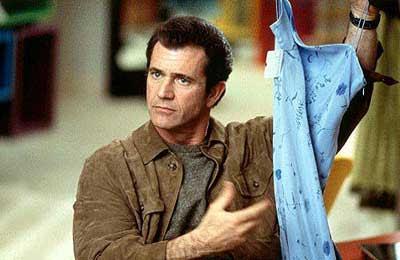 Gibson in the comedy What Women Want (2000).
Gibson in the comedy What Women Want (2000).It must have been great to be surrounded by such great actresses, many of whom took small parts to be in this film.
Yeah, but all little gems, you know? Marisa and Helen's parts were not huge, but were very substantial, I thought, and they all carried them off terrifically. Working with all women was a really tremendous experience for me.
Helen Hunt seems like she'd be a great sparring partner in a scene. She comes across as a very intelligent actress.
She's very analytical about everything, and that's good. She doesn't just do stuff because it's there. She wants a reason. She has to have a foundation that she can use as a springboard. She's very conscientious about exploring things to that end as long as she can before she actually has to commit it to celluloid, and that's great for me to get all that feedback and generosity, as well. And she's just a hell of a nice gal to hang around with.
The old saying is "Dying is easy, comedy is hard." Is it equally challenging playing a part like this as it is to play Hamlet?
Sure. Comedy, I think, is underrated for the degree of difficulty associated with it because the whole essence of it is: if you pull it off, it should look effortless. Therefore people think it doesn't require any effort, when in fact, there's a great deal of underpinning that goes into falling off that log. This had a lot of challenges, acting with thoughts instead of dialogue, for example. Plus a lot of athleticism came into play. I mean, you can really get hurt bouncing around bathrooms, bumping into toilets and falling into bathtubs with a hairdryer. (laughs)
Let's talk about your background. You were born in the U.S., but moved to Australia as a kid. Legend has it that your dad won big on "Jeopardy," true?
Yeah. He just had a desire for change, I think. There's been all this stuff written about him avoiding the Vietnam draft for my older brothers, which is absurd, because you had just as much of a chance getting drafted for Vietnam in Australia. A lot of people don't know that there were many Aussies over there. My dad worked on the railways, and retrained as a computer programmer, back in the early days of it, after he'd injured himself. He had a tremendous general knowledge of literature, geography, mathematics. He was a very smart guy, so he could go on "Jeopardy" and knock off all the questions, or come up with all the questions. His people had come from Australia originally. His mother was an Australian opera singer who married a Chicago businessman. My mother was born in Ireland.
I read that when you were in drama school, you and Geoffery Rush (Shine, Quills) were roommates.
Yeah, Geoff and I did a few stage shows together. He was educated in a totally different way than I was. He got his education in Europe, and he went to what I thought was an amazing-sounding place. It was like a clown school, like in the classic sense of the comedia del arté, the French comedy. So he had a really different kind of bag of tricks and sensibility about him. It was very interesting for me to meet somebody like him. He used to write his own stage shows, which were like clown shows that he would come out and perform with his cohorts. He'd write and direct them, and they'd be little treats, and that's what he loved to do. They were full of good vibes and love. He's a real artist.
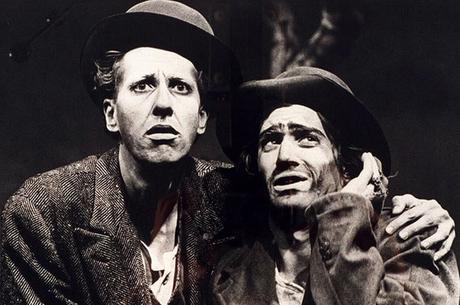
Gibson and Geoffrey Rush in Waiting for Godot, at Australia's National Institute of Dramatic Art, 1979.
Early on, you worked with Peter Weir and George Miller. How did they influence you as a filmmaker?
They influenced me tremendously. If your first dalliance in film was with these two guys...I was a stranger to film up until that point. They're both very different as men, and very different in their approach to filmmaking, which was a great lesson, because it showed me that there's no right way to make a film, because they both achieved excellence from a totally different perspective. It was a wonderful experience working with them. I was always asking questions and they were both very generous people and would answer, because I was like the annoying kid 'What's that?' and they were all too willing to share their thoughts and their vision. For me, that was like heaven. Also, there was a part of me that was insecure too, because I was young and I had this longing for an understanding of what it was they were doing so I could have a better foundation, almost clutching at straws. Inadvertently, I would pick up a lot more as a result. Actually, it's been that way with most of the directors I've worked with. I've been lucky.
Did you always have the desire to direct, or did that come later?
That came later on. It wasn't something that I was aiming at or planning, it just happened. Bing! The light just came on and I said 'I've gotta do this, and I think I can.' My film school was men like Peter and George. And after 20 years of hanging around movie sets, instead of retreating to a trailer and hiding out, I would stick around and watch what it was that they did. It was a big education.
You seem to be a naturally curious person, about all things. That's evident from your filmography, with Lethal Weapon on one end and Hamlet on the other.
Yeah, I think variety is the spice of life and I like to hop around and do different things. There's a smorgasbord out there to be had if you can take advantage of it.
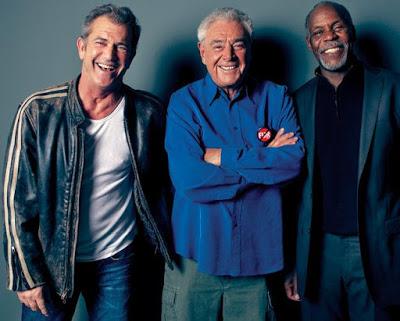 Gibson, director Richard Donner and Danny Glover.
Gibson, director Richard Donner and Danny Glover. The director you've worked with the most is Richard Donner (six films). Tell us about working with him and what you've learned from him.
Uncle Dick. He's a great guy, just terrific. Extremely professional. He's an old veteran and has an understanding of film that is the culmination of years of experience. He's got his technical stuff down, his vision down. No matter what you say about Dick, it underrates him. He really loves what he's doing, loves working with actors and he allows you freedom to explore all kind of areas. "All right kid," he'll say, and slap you on the back and let you try something, because even he doesn't know sometimes. He's just an extremely charming, talented, great fuckin' guy. I love him.
Were you always drawn to movies as a kid?
I think so, although my main experience with the cinema was on television in the 60's. I didn't go to the cinema. There were too many of us and the cinema was too far away. We had a black and white TV where the fuses used to go (out) on it. We'd kick it in the slats and we'd watch something with a distorted picture, but it was good enough. So during the 60's, of course, what you mostly saw was films from the 40's.
What were some of those that really grabbed you?
Oh God...all of them. I remember seeing films with adult themes that I couldn't even understand, but I was intrigued by them. Some of it was so disturbing like The Lost Weekend (1945) where the bat bites the mouse and the mouse bleeds down the wall and Ray Milland is going crazy...that kind of stuff. When you're eight years old and watching this it's like an acid trip! I was like 'Whoah! What's up with this?!' You don't quite get it, but it never leaves, you know. Those images are very powerful. All of them were great, the Billy Wilders, the Frank Capras, Ernst Lubitsch, Preston Sturges. This was the golden age, the really great films with a lot of heart and made with a lot of care. And made fast, I guess, with great performances from people like Henry Fonda, Jimmy Stewart, Spencer Tracy. So yes, I was a film fan from way back. And I think we've managed to capture some of that with this film, especially in the scenes that I have with Alan Alda where we're in there talking a mile a minute and it's going back and forth and we're getting into these bizarre things.
That stuff was great! It reminded me of The Apartment (1960) and the scenes between Jack Lemmon and Fred MacMurray.
Fred MacMurray, wow, he was great! That was a great movie. And how about Double Indemnity (1944)? That's a movie I could watch again and again.
Most people now just know him from "My Three Sons," but he was an incredible dramatic actor.
He was good in that...The Caine Mutiny (1954) was another great one. He was a little slimy in that one, but what an actor!
Who are some of the actors that you've worked with that have had a profound influence on you?
Gosh, I think just about all of them. I was like a little sponge in the beginning, I was so young when I came to it, so everyone really had a huge impact on me. And I hope I'm imparting something to younger people that I work with now, because I think it's a tradition that gets passed on and you take the best of what you see, or you try to take it. Certainly working with someone like Tony Hopkins was great. He has great restraint and, obviously, had a lot more experience than I did. With very few exceptions, I've had a wonderful experience working with nearly every actor I've crossed paths with.
Tell us about how you interpreted the part of Hamlet. You seemed to have a very unique take on it.
That's tricky. I don't really believe I've ever done it, because we didn't really rehearse and didn't do it in sequence. It was shot back to front, upside down, like a film and then they slapped it together in the right order in the edit. So I don't really know what it's like to go through it chronologically and do it from beginning to end. But in reading it and preparing for and trying to delve into it as deeply as I can, and since there are as many Hamlets as there are of us, I guess it's going to squeak out your way because it speaks to the soul of most of us. That's the great mastery of it and why it's a masterpiece. But the one thing I did come across was an essay I read by A.C. Bradley called The Nature of Melancholy, where he said the Elizabethan definition of "melancholy" was quite different from the one we have today. It wasn't just that listless kind of guy. It could be that, but that was just one aspect of it. To be trapped in a mood, and unable to escape from it for a while until something came along, some force or intervening thing to knock you out of it into another mood or mode that you then couldn't escape from until something else came along and knocked you out of it. Then you were trapped in this psychotic state. Usually you associate Hamlet with being this listless guy who doesn't want to live, and that's one part of him, but he's also this guy who's got this incredible rage, passion, anger, humor and mercurial qualities and all this kind of stuff. I tried to follow that line as much as I could with the tools that were given, but it's a tricky one. I still don't feel like I ever did it, which is one reason I want to do a stage production of it and get a younger guy to do it so I can watch it in the right order! (laughs)
In both Man Without a Face and Braveheart you were in virtually every scene. What's it like doing double duty as star and director?
Schizophrenic. (laughs) The biggest single problem you have with that situation is time management. There just isn't time for anything else. In fact, there's hardly time for time management, and that's a problem because if you don't have enough time to let something incubate, sometimes it doesn't come out as well as it should, so you try to find ways to make all that work in a way you feel secure with. I had days on Braveheart where I didn't have to get into costume or do anything and just had to be behind the camera and insist on getting the thing realized, you know? I enjoyed that a lot more than on the days when I had to get in front of the camera. That used to make me cranky because it was like the fly in the ointment. I used to do anything to avoid hopping in front of the camera. The first assistant director would come up and say (cockney accent) "I think it's about time you hop in front of the camera." And I'd go (sigh) 'Yeah, alright.' So I'd hop in, and spend as little time there as possible and then get out. It just took too much energy doing both.
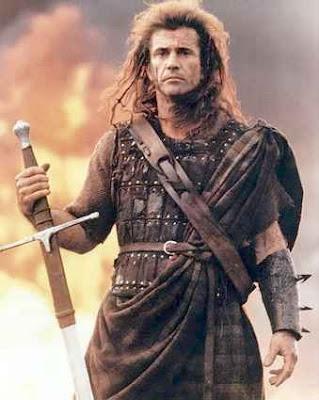 Gibson in his Oscar-winning Braveheart (1995).
Gibson in his Oscar-winning Braveheart (1995). I take it the next time you direct, you won't be in front of the camera?
No. I'll never do that again. It's the most exhausting thing I've ever done.
You got to work with one of my favorite actors, Patrick McGoohan, in Braveheart. Tell us about him.
I was looking for someone to play King Edward, and no one was right. One day the casting lady said "Well, there's always Pat McGoohan." I thought he was dead! (laughs) She said "No, he lives over in Los Angeles." I was like 'Then fuckin' call him!' So I came back here and met him in a restaurant and offered it to him because I remember him in the old days in TV shows like Secret Agent and The Prisoner, which was very cutting edge for its time, still is actually. Those conversations he gets into with (his captors), it's like Beckett sometimes, you know? Beckett meets Kafka. They actually had approached Pat to play Bond, before Connery, and he turned them down. He was a really handsome guy as a young man. Big guy, very imposing. It's funny, nobody recognized him in Braveheart because we put a prosthetic nose on Pat so he'd look more English. Pat has a very Irish nose. (laughs) He has a really startling presence and can just stare at you and make you wilt! (laughs)
Were there any epic movies of the past you studied before doing Braveheart?
I made a tape that I called Carnage: Past and Present where I listed any film I could think of that had battle scenes and had my assistant get them and he compiled a tape with these sequences from all these different films. I said 'Okay, we've got to go beyond all this stuff.' I think the nearest I saw to what I wanted was in Orson Welles' Chimes at Midnight (1966). It was black and white and there were some neat aspects to the battle scenes that he really made work, even though he had a very low budget. It was almost like newsreel footage, the way he shot it. It was really cool. So I went from everything I saw and then tried to make it my own way. I looked at these illustrations that depicted these massive confrontations of the period, and it was just claustrophobic and in your face, horses falling over on people, just a mess.
The Road Warrior and Gallipoli really propelled you to overnight stardom. You were still a kid at the time. What was it like going from working actor to being under the microscope, so to speak?
I think the shock kind of settled in a couple years later as the accouterments and the things that go with that were built. The lawyers, the press, loss of anonymity, all the stuff that no one tells you about. It's like being a blind man walking into the woods. It takes a while to come to terms with that, this new world that you're having to exist in. You have to accept it, then adapt to it so it can be yours again. That takes a little work. I could have easily walked away. I did Gallipoli with a young actor called Mark Lee, and we were both on the same ride for a while. He got to a clear place where he had to make a choice. It was the next step and he clearly chose not to take it. Milos Forman offered him the part of Mozart in Amadeus. That's a big decision for a young fella! He talked to me about it. He said "I'm not digging this shit. I'm walking out." So it's a choice you make, in a sense. I don't think the full consequences of it hit me 'til later, and I think Mark had more of an insight into it. He stayed in Australia, got married, had some kids. He wanted to keep it simple, didn't want it to get nuts.
I really liked The Patriot and it didn't perform as well at the box office as people expected it to. Is there ever a way to predict how well a film will do, or is it always a crapshoot?
Always a crapshoot. Nobody knows anything, and I include myself in the multitude of the ignorant. There's no gauge. I've seen great films, perfect almost, that never do any business. Something didn't make everyone go. And I've seen real pieces of garbage work like gangbusters. William Goldman had a whole half of his book, Adventures in the Screen Trade, devoted to the fact that no one in Hollywood knows anything. You can make an educated guess, but after that it's a crapshoot.
Do you still divide your time between here and Australia?
Not as much. I still have a ranch there, outside Sydney, but it's not like it used to be. I used to spend most of my time down there. I think I'll try to get another film started in Australia. I had tried not too long ago to get something started with Fox studios down there, but it turned out to be a less-than-ideal situation where, quite frankly, I had my hands tied most of the time. One of those political screwups, a lot of politics and egos involved. If I try it again, I'll do it simpler.
How much do you like to actually be directed? Or do you just prefer to be left alone?
It's a funny thing, you don't just turn up. You talk about it a lot. There's a lot of underpinning that goes on if you really want to do your job right, you want to get into the director's head about how he sees things and have him explain as much as possible every facet of what he's doing to assist you in helping him do what he's trying to do. Then I just like to turn up and see if I can blow the guys mind. If not, I certainly want him to tell me, and I certainly want him to watch closely to make sure that I'm not doing something contrary to his big picture. And bless 'em all, most of them do a great job at that.
Have any of your kids expressed interest in following your footsteps?
Yeah, I've got one fella, he's about halfway through the pack, who's like that. I know he's going to end up there, probably as an actor, but I don't know for sure. He could wind up on the other side of the camera. He already displays a real knack for storytelling that is astounding to me. It's like having a 13 year-old stand-up in the house. (laughs) I do marvel at his adroitness and his ability at so young an age.
Obviously your sister saw the same thing in you when she enrolled you in drama school without your knowledge.
Well, that was one of those things where fate grabbed me by the fingertips and kicked me off in a certain direction. I never would have done it myself. She more or less gave me a friendly push.
Do you consider yourself an American, an Aussie, or a little of both?
Well, I am what I am: hybrid boy. I've been bouncing across there like a ping pong ball my whole life, so I don't make that distinction. I only think about it when someone asks me that. It doesn't make sense to me almost. The cultures are very similar, actually. I don't know of any two nations that are more similar, actually, even more so than the U.S. and Canada, which is weird, huh? It's the attitude. I think the Canadians resent the United States because they're so close, I think they feel suffocated by them. They shouldn't, because they have their thing, which is great. Australia has always been very much its own place. In that respect, they're pretty much the same types of people, same stock of people with a lot of the same sensibilities and ethical codes. I think Australia has really come into its own in the afterglow of the Olympic games, because they got to play host to the entire world, and pulled it off with great aplomb. I think they enjoyed the rest of the world's company.
What advice would you give to a first-time director?
It would depend on the guy. If it's a guy who's been in the film business for years who's been on lots of sets and around a hub of activity, I would say exactly what Clint Eastwood said to me. Before I made my first film, I was really scared and looking for some cues. I had seen Unforgiven (1992), and really liked it and I called Clint up and told him that I was about to direct my first film and 'What's the deal?' He said (Eastwood voice) "What're you, scared?" I said 'Fuckin' A, I'm really scared!' (laughs) He said "You'll be surprised. You've been hanging around a long time and there's lots of subliminal shit that you've picked up and you don't even know it's in there." He was right! There was lots of stuff that was just there. The only thing is, you can't look at the whole piece, otherwise it'll just scare you. You have to look at the first day, then the second day, and if that's too weird, break it down into first half-day.
It's like a 12 step program.
It really is. You just have to do it as well as you can. Because it's like being tossed in a very big body of water and told to swim to shore. You have a general idea of which direction the shore is, but you may not get there for a long time. So the best thing to do is not to waste energy thinking about it. Just take one stroke at a time. You can drown in a mire of worry with some of this stuff, but it doesn't pay, because tomorrow always takes care of itself.
